Healthcare Law: Justifying Overriding Treatment Refusal by a Child
VerifiedAdded on 2023/02/01
|9
|3222
|40
Essay
AI Summary
This essay delves into the intricacies of healthcare law, focusing on the concept of Gillick competence and its implications for a child's right to consent to or refuse medical treatment. It begins by outlining the foundational principles of Gillick competence, including how it is assessed and the rationale behind it, referencing relevant legal precedents like the Gillick case. The essay then analyzes the legal and ethical arguments surrounding the overriding of a Gillick-competent child's decision to refuse medical treatment, examining the interplay between the child's autonomy, parental rights, and the responsibilities of healthcare professionals. The analysis incorporates case studies to illustrate the practical application of these principles, exploring scenarios where a child's wishes conflict with medical recommendations or parental desires. The essay considers the factors that justify overriding a child's refusal, such as the potential for serious harm or the child's limited understanding of the long-term consequences. The essay explores the ethical considerations, including beneficence, non-maleficence, and respect for autonomy. It also investigates whether it is possible to separate legal arguments from ethical/moral arguments, highlighting the challenges of balancing these competing interests in the context of healthcare decisions for minors. The essay concludes by synthesizing the legal and ethical arguments, offering a comprehensive understanding of the complex issues surrounding a child's right to make medical decisions.
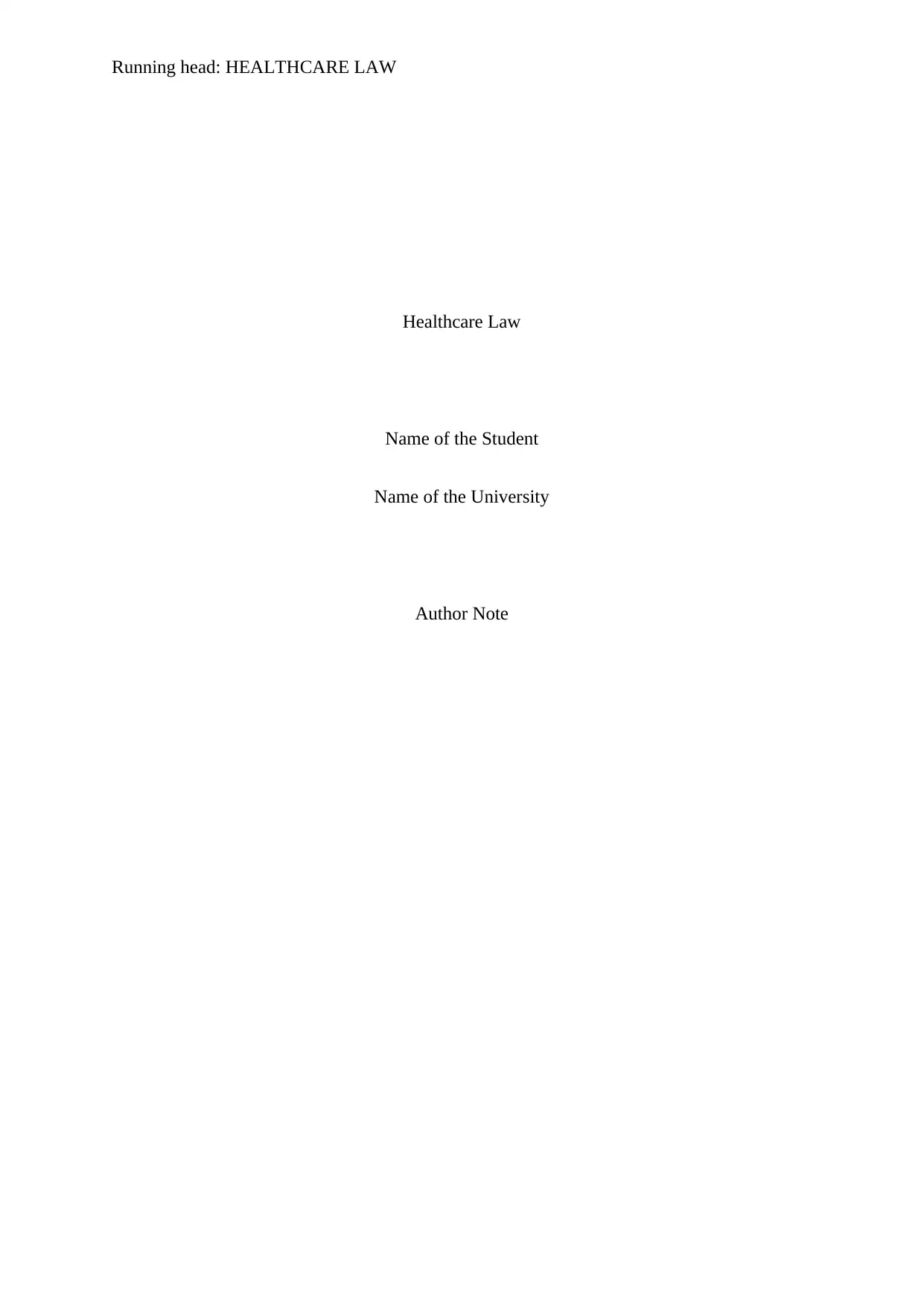
Running head: HEALTHCARE LAW
Healthcare Law
Name of the Student
Name of the University
Author Note
Healthcare Law
Name of the Student
Name of the University
Author Note
Paraphrase This Document
Need a fresh take? Get an instant paraphrase of this document with our AI Paraphraser
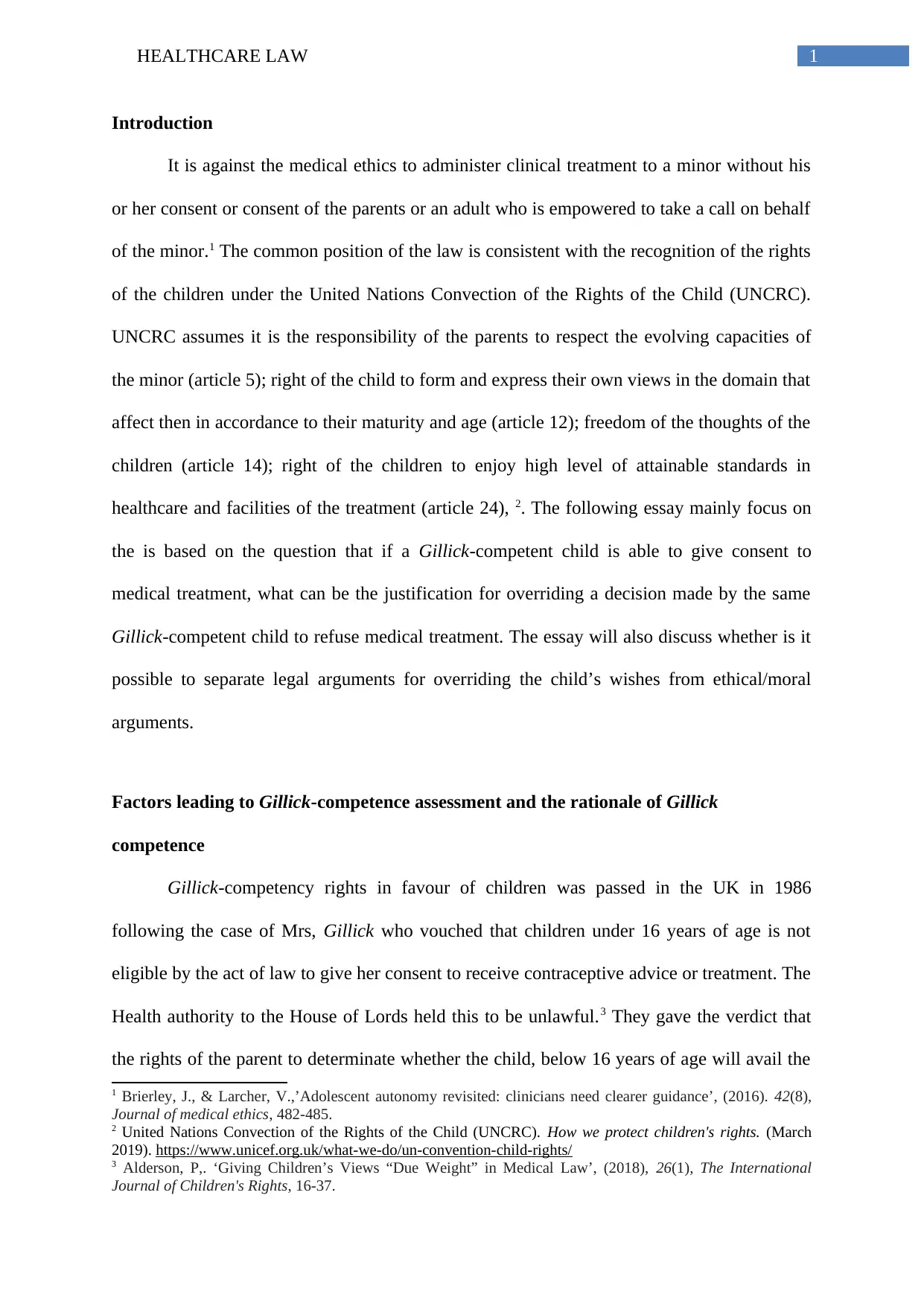
1HEALTHCARE LAW
Introduction
It is against the medical ethics to administer clinical treatment to a minor without his
or her consent or consent of the parents or an adult who is empowered to take a call on behalf
of the minor.1 The common position of the law is consistent with the recognition of the rights
of the children under the United Nations Convection of the Rights of the Child (UNCRC).
UNCRC assumes it is the responsibility of the parents to respect the evolving capacities of
the minor (article 5); right of the child to form and express their own views in the domain that
affect then in accordance to their maturity and age (article 12); freedom of the thoughts of the
children (article 14); right of the children to enjoy high level of attainable standards in
healthcare and facilities of the treatment (article 24), 2. The following essay mainly focus on
the is based on the question that if a Gillick-competent child is able to give consent to
medical treatment, what can be the justification for overriding a decision made by the same
Gillick-competent child to refuse medical treatment. The essay will also discuss whether is it
possible to separate legal arguments for overriding the child’s wishes from ethical/moral
arguments.
Factors leading to Gillick-competence assessment and the rationale of Gillick
competence
Gillick-competency rights in favour of children was passed in the UK in 1986
following the case of Mrs, Gillick who vouched that children under 16 years of age is not
eligible by the act of law to give her consent to receive contraceptive advice or treatment. The
Health authority to the House of Lords held this to be unlawful.3 They gave the verdict that
the rights of the parent to determinate whether the child, below 16 years of age will avail the
1 Brierley, J., & Larcher, V.,’Adolescent autonomy revisited: clinicians need clearer guidance’, (2016). 42(8),
Journal of medical ethics, 482-485.
2 United Nations Convection of the Rights of the Child (UNCRC). How we protect children's rights. (March
2019). https://www.unicef.org.uk/what-we-do/un-convention-child-rights/
3 Alderson, P,. ‘Giving Children’s Views “Due Weight” in Medical Law’, (2018), 26(1), The International
Journal of Children's Rights, 16-37.
Introduction
It is against the medical ethics to administer clinical treatment to a minor without his
or her consent or consent of the parents or an adult who is empowered to take a call on behalf
of the minor.1 The common position of the law is consistent with the recognition of the rights
of the children under the United Nations Convection of the Rights of the Child (UNCRC).
UNCRC assumes it is the responsibility of the parents to respect the evolving capacities of
the minor (article 5); right of the child to form and express their own views in the domain that
affect then in accordance to their maturity and age (article 12); freedom of the thoughts of the
children (article 14); right of the children to enjoy high level of attainable standards in
healthcare and facilities of the treatment (article 24), 2. The following essay mainly focus on
the is based on the question that if a Gillick-competent child is able to give consent to
medical treatment, what can be the justification for overriding a decision made by the same
Gillick-competent child to refuse medical treatment. The essay will also discuss whether is it
possible to separate legal arguments for overriding the child’s wishes from ethical/moral
arguments.
Factors leading to Gillick-competence assessment and the rationale of Gillick
competence
Gillick-competency rights in favour of children was passed in the UK in 1986
following the case of Mrs, Gillick who vouched that children under 16 years of age is not
eligible by the act of law to give her consent to receive contraceptive advice or treatment. The
Health authority to the House of Lords held this to be unlawful.3 They gave the verdict that
the rights of the parent to determinate whether the child, below 16 years of age will avail the
1 Brierley, J., & Larcher, V.,’Adolescent autonomy revisited: clinicians need clearer guidance’, (2016). 42(8),
Journal of medical ethics, 482-485.
2 United Nations Convection of the Rights of the Child (UNCRC). How we protect children's rights. (March
2019). https://www.unicef.org.uk/what-we-do/un-convention-child-rights/
3 Alderson, P,. ‘Giving Children’s Views “Due Weight” in Medical Law’, (2018), 26(1), The International
Journal of Children's Rights, 16-37.
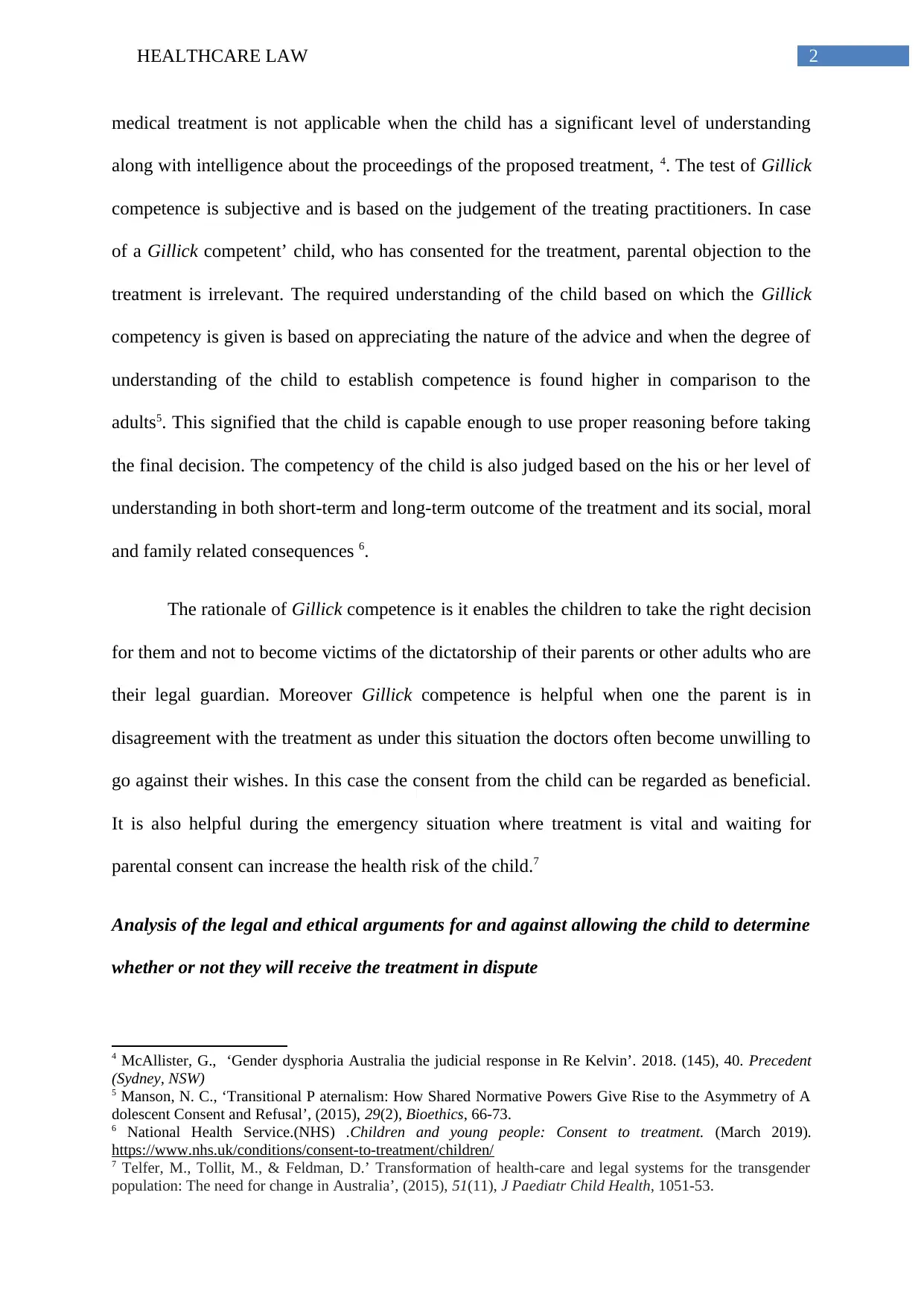
2HEALTHCARE LAW
medical treatment is not applicable when the child has a significant level of understanding
along with intelligence about the proceedings of the proposed treatment, 4. The test of Gillick
competence is subjective and is based on the judgement of the treating practitioners. In case
of a Gillick competent’ child, who has consented for the treatment, parental objection to the
treatment is irrelevant. The required understanding of the child based on which the Gillick
competency is given is based on appreciating the nature of the advice and when the degree of
understanding of the child to establish competence is found higher in comparison to the
adults5. This signified that the child is capable enough to use proper reasoning before taking
the final decision. The competency of the child is also judged based on the his or her level of
understanding in both short-term and long-term outcome of the treatment and its social, moral
and family related consequences 6.
The rationale of Gillick competence is it enables the children to take the right decision
for them and not to become victims of the dictatorship of their parents or other adults who are
their legal guardian. Moreover Gillick competence is helpful when one the parent is in
disagreement with the treatment as under this situation the doctors often become unwilling to
go against their wishes. In this case the consent from the child can be regarded as beneficial.
It is also helpful during the emergency situation where treatment is vital and waiting for
parental consent can increase the health risk of the child.7
Analysis of the legal and ethical arguments for and against allowing the child to determine
whether or not they will receive the treatment in dispute
4 McAllister, G., ‘Gender dysphoria Australia the judicial response in Re Kelvin’. 2018. (145), 40. Precedent
(Sydney, NSW)
5 Manson, N. C., ‘Transitional P aternalism: How Shared Normative Powers Give Rise to the Asymmetry of A
dolescent Consent and Refusal’, (2015), 29(2), Bioethics, 66-73.
6 National Health Service.(NHS) .Children and young people: Consent to treatment. (March 2019).
https://www.nhs.uk/conditions/consent-to-treatment/children/
7 Telfer, M., Tollit, M., & Feldman, D.’ Transformation of health-care and legal systems for the transgender
population: The need for change in Australia’, (2015), 51(11), J Paediatr Child Health, 1051-53.
medical treatment is not applicable when the child has a significant level of understanding
along with intelligence about the proceedings of the proposed treatment, 4. The test of Gillick
competence is subjective and is based on the judgement of the treating practitioners. In case
of a Gillick competent’ child, who has consented for the treatment, parental objection to the
treatment is irrelevant. The required understanding of the child based on which the Gillick
competency is given is based on appreciating the nature of the advice and when the degree of
understanding of the child to establish competence is found higher in comparison to the
adults5. This signified that the child is capable enough to use proper reasoning before taking
the final decision. The competency of the child is also judged based on the his or her level of
understanding in both short-term and long-term outcome of the treatment and its social, moral
and family related consequences 6.
The rationale of Gillick competence is it enables the children to take the right decision
for them and not to become victims of the dictatorship of their parents or other adults who are
their legal guardian. Moreover Gillick competence is helpful when one the parent is in
disagreement with the treatment as under this situation the doctors often become unwilling to
go against their wishes. In this case the consent from the child can be regarded as beneficial.
It is also helpful during the emergency situation where treatment is vital and waiting for
parental consent can increase the health risk of the child.7
Analysis of the legal and ethical arguments for and against allowing the child to determine
whether or not they will receive the treatment in dispute
4 McAllister, G., ‘Gender dysphoria Australia the judicial response in Re Kelvin’. 2018. (145), 40. Precedent
(Sydney, NSW)
5 Manson, N. C., ‘Transitional P aternalism: How Shared Normative Powers Give Rise to the Asymmetry of A
dolescent Consent and Refusal’, (2015), 29(2), Bioethics, 66-73.
6 National Health Service.(NHS) .Children and young people: Consent to treatment. (March 2019).
https://www.nhs.uk/conditions/consent-to-treatment/children/
7 Telfer, M., Tollit, M., & Feldman, D.’ Transformation of health-care and legal systems for the transgender
population: The need for change in Australia’, (2015), 51(11), J Paediatr Child Health, 1051-53.
⊘ This is a preview!⊘
Do you want full access?
Subscribe today to unlock all pages.

Trusted by 1+ million students worldwide
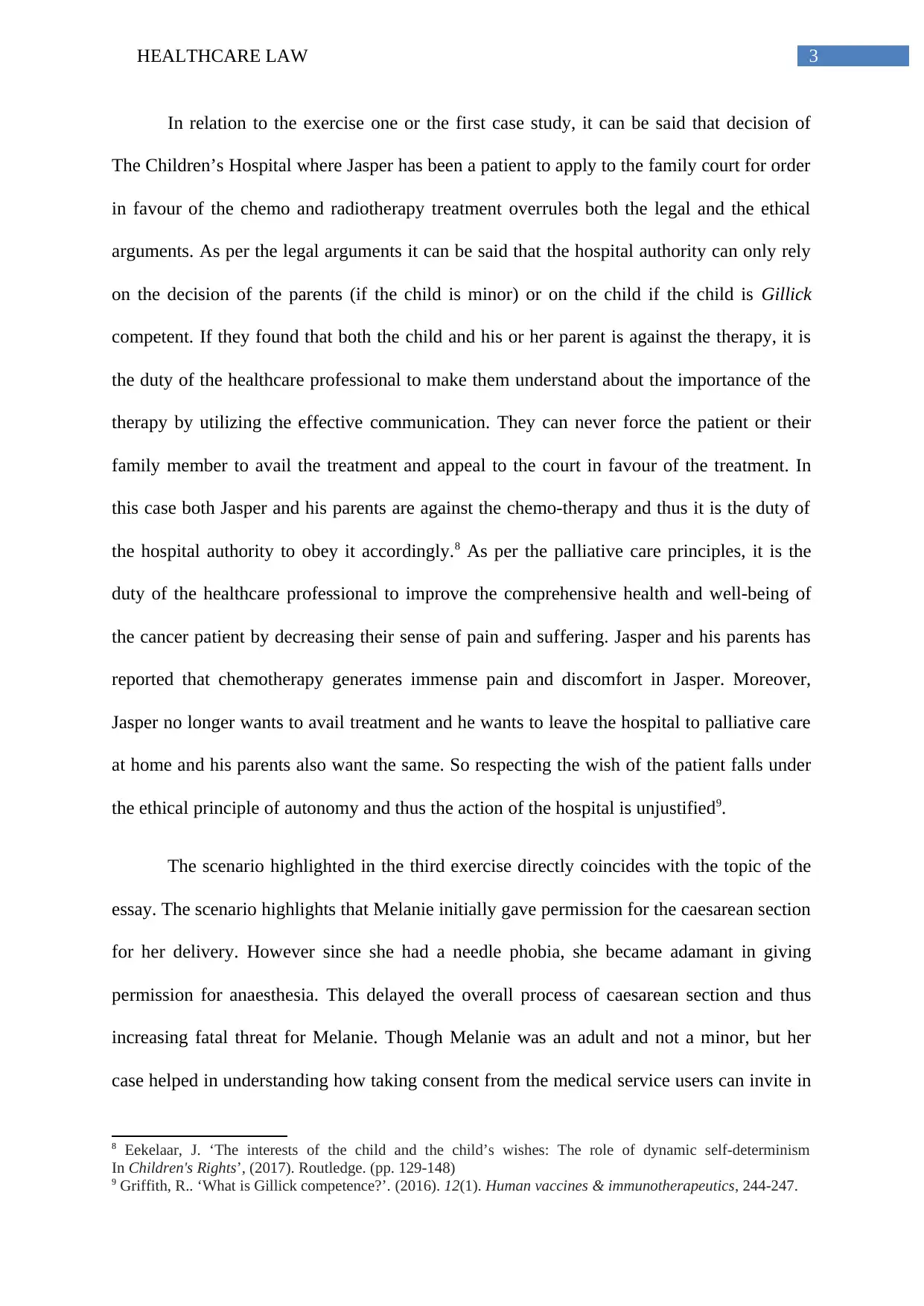
3HEALTHCARE LAW
In relation to the exercise one or the first case study, it can be said that decision of
The Children’s Hospital where Jasper has been a patient to apply to the family court for order
in favour of the chemo and radiotherapy treatment overrules both the legal and the ethical
arguments. As per the legal arguments it can be said that the hospital authority can only rely
on the decision of the parents (if the child is minor) or on the child if the child is Gillick
competent. If they found that both the child and his or her parent is against the therapy, it is
the duty of the healthcare professional to make them understand about the importance of the
therapy by utilizing the effective communication. They can never force the patient or their
family member to avail the treatment and appeal to the court in favour of the treatment. In
this case both Jasper and his parents are against the chemo-therapy and thus it is the duty of
the hospital authority to obey it accordingly.8 As per the palliative care principles, it is the
duty of the healthcare professional to improve the comprehensive health and well-being of
the cancer patient by decreasing their sense of pain and suffering. Jasper and his parents has
reported that chemotherapy generates immense pain and discomfort in Jasper. Moreover,
Jasper no longer wants to avail treatment and he wants to leave the hospital to palliative care
at home and his parents also want the same. So respecting the wish of the patient falls under
the ethical principle of autonomy and thus the action of the hospital is unjustified9.
The scenario highlighted in the third exercise directly coincides with the topic of the
essay. The scenario highlights that Melanie initially gave permission for the caesarean section
for her delivery. However since she had a needle phobia, she became adamant in giving
permission for anaesthesia. This delayed the overall process of caesarean section and thus
increasing fatal threat for Melanie. Though Melanie was an adult and not a minor, but her
case helped in understanding how taking consent from the medical service users can invite in
8 Eekelaar, J. ‘The interests of the child and the child’s wishes: The role of dynamic self-determinism
In Children's Rights’, (2017). Routledge. (pp. 129-148)
9 Griffith, R.. ‘What is Gillick competence?’. (2016). 12(1). Human vaccines & immunotherapeutics, 244-247.
In relation to the exercise one or the first case study, it can be said that decision of
The Children’s Hospital where Jasper has been a patient to apply to the family court for order
in favour of the chemo and radiotherapy treatment overrules both the legal and the ethical
arguments. As per the legal arguments it can be said that the hospital authority can only rely
on the decision of the parents (if the child is minor) or on the child if the child is Gillick
competent. If they found that both the child and his or her parent is against the therapy, it is
the duty of the healthcare professional to make them understand about the importance of the
therapy by utilizing the effective communication. They can never force the patient or their
family member to avail the treatment and appeal to the court in favour of the treatment. In
this case both Jasper and his parents are against the chemo-therapy and thus it is the duty of
the hospital authority to obey it accordingly.8 As per the palliative care principles, it is the
duty of the healthcare professional to improve the comprehensive health and well-being of
the cancer patient by decreasing their sense of pain and suffering. Jasper and his parents has
reported that chemotherapy generates immense pain and discomfort in Jasper. Moreover,
Jasper no longer wants to avail treatment and he wants to leave the hospital to palliative care
at home and his parents also want the same. So respecting the wish of the patient falls under
the ethical principle of autonomy and thus the action of the hospital is unjustified9.
The scenario highlighted in the third exercise directly coincides with the topic of the
essay. The scenario highlights that Melanie initially gave permission for the caesarean section
for her delivery. However since she had a needle phobia, she became adamant in giving
permission for anaesthesia. This delayed the overall process of caesarean section and thus
increasing fatal threat for Melanie. Though Melanie was an adult and not a minor, but her
case helped in understanding how taking consent from the medical service users can invite in
8 Eekelaar, J. ‘The interests of the child and the child’s wishes: The role of dynamic self-determinism
In Children's Rights’, (2017). Routledge. (pp. 129-148)
9 Griffith, R.. ‘What is Gillick competence?’. (2016). 12(1). Human vaccines & immunotherapeutics, 244-247.
Paraphrase This Document
Need a fresh take? Get an instant paraphrase of this document with our AI Paraphraser
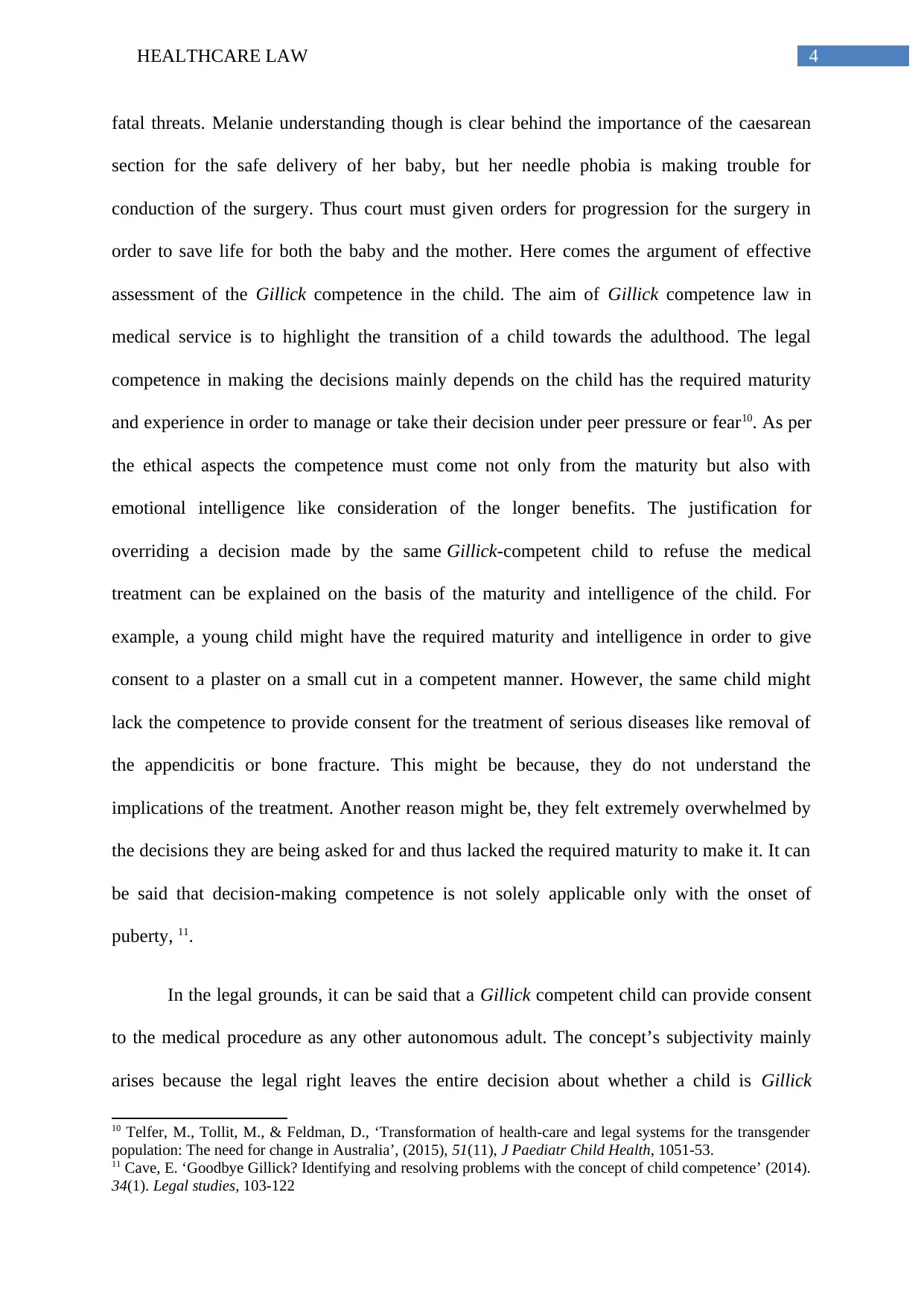
4HEALTHCARE LAW
fatal threats. Melanie understanding though is clear behind the importance of the caesarean
section for the safe delivery of her baby, but her needle phobia is making trouble for
conduction of the surgery. Thus court must given orders for progression for the surgery in
order to save life for both the baby and the mother. Here comes the argument of effective
assessment of the Gillick competence in the child. The aim of Gillick competence law in
medical service is to highlight the transition of a child towards the adulthood. The legal
competence in making the decisions mainly depends on the child has the required maturity
and experience in order to manage or take their decision under peer pressure or fear10. As per
the ethical aspects the competence must come not only from the maturity but also with
emotional intelligence like consideration of the longer benefits. The justification for
overriding a decision made by the same Gillick-competent child to refuse the medical
treatment can be explained on the basis of the maturity and intelligence of the child. For
example, a young child might have the required maturity and intelligence in order to give
consent to a plaster on a small cut in a competent manner. However, the same child might
lack the competence to provide consent for the treatment of serious diseases like removal of
the appendicitis or bone fracture. This might be because, they do not understand the
implications of the treatment. Another reason might be, they felt extremely overwhelmed by
the decisions they are being asked for and thus lacked the required maturity to make it. It can
be said that decision-making competence is not solely applicable only with the onset of
puberty, 11.
In the legal grounds, it can be said that a Gillick competent child can provide consent
to the medical procedure as any other autonomous adult. The concept’s subjectivity mainly
arises because the legal right leaves the entire decision about whether a child is Gillick
10 Telfer, M., Tollit, M., & Feldman, D., ‘Transformation of health-care and legal systems for the transgender
population: The need for change in Australia’, (2015), 51(11), J Paediatr Child Health, 1051-53.
11 Cave, E. ‘Goodbye Gillick? Identifying and resolving problems with the concept of child competence’ (2014).
34(1). Legal studies, 103-122
fatal threats. Melanie understanding though is clear behind the importance of the caesarean
section for the safe delivery of her baby, but her needle phobia is making trouble for
conduction of the surgery. Thus court must given orders for progression for the surgery in
order to save life for both the baby and the mother. Here comes the argument of effective
assessment of the Gillick competence in the child. The aim of Gillick competence law in
medical service is to highlight the transition of a child towards the adulthood. The legal
competence in making the decisions mainly depends on the child has the required maturity
and experience in order to manage or take their decision under peer pressure or fear10. As per
the ethical aspects the competence must come not only from the maturity but also with
emotional intelligence like consideration of the longer benefits. The justification for
overriding a decision made by the same Gillick-competent child to refuse the medical
treatment can be explained on the basis of the maturity and intelligence of the child. For
example, a young child might have the required maturity and intelligence in order to give
consent to a plaster on a small cut in a competent manner. However, the same child might
lack the competence to provide consent for the treatment of serious diseases like removal of
the appendicitis or bone fracture. This might be because, they do not understand the
implications of the treatment. Another reason might be, they felt extremely overwhelmed by
the decisions they are being asked for and thus lacked the required maturity to make it. It can
be said that decision-making competence is not solely applicable only with the onset of
puberty, 11.
In the legal grounds, it can be said that a Gillick competent child can provide consent
to the medical procedure as any other autonomous adult. The concept’s subjectivity mainly
arises because the legal right leaves the entire decision about whether a child is Gillick
10 Telfer, M., Tollit, M., & Feldman, D., ‘Transformation of health-care and legal systems for the transgender
population: The need for change in Australia’, (2015), 51(11), J Paediatr Child Health, 1051-53.
11 Cave, E. ‘Goodbye Gillick? Identifying and resolving problems with the concept of child competence’ (2014).
34(1). Legal studies, 103-122
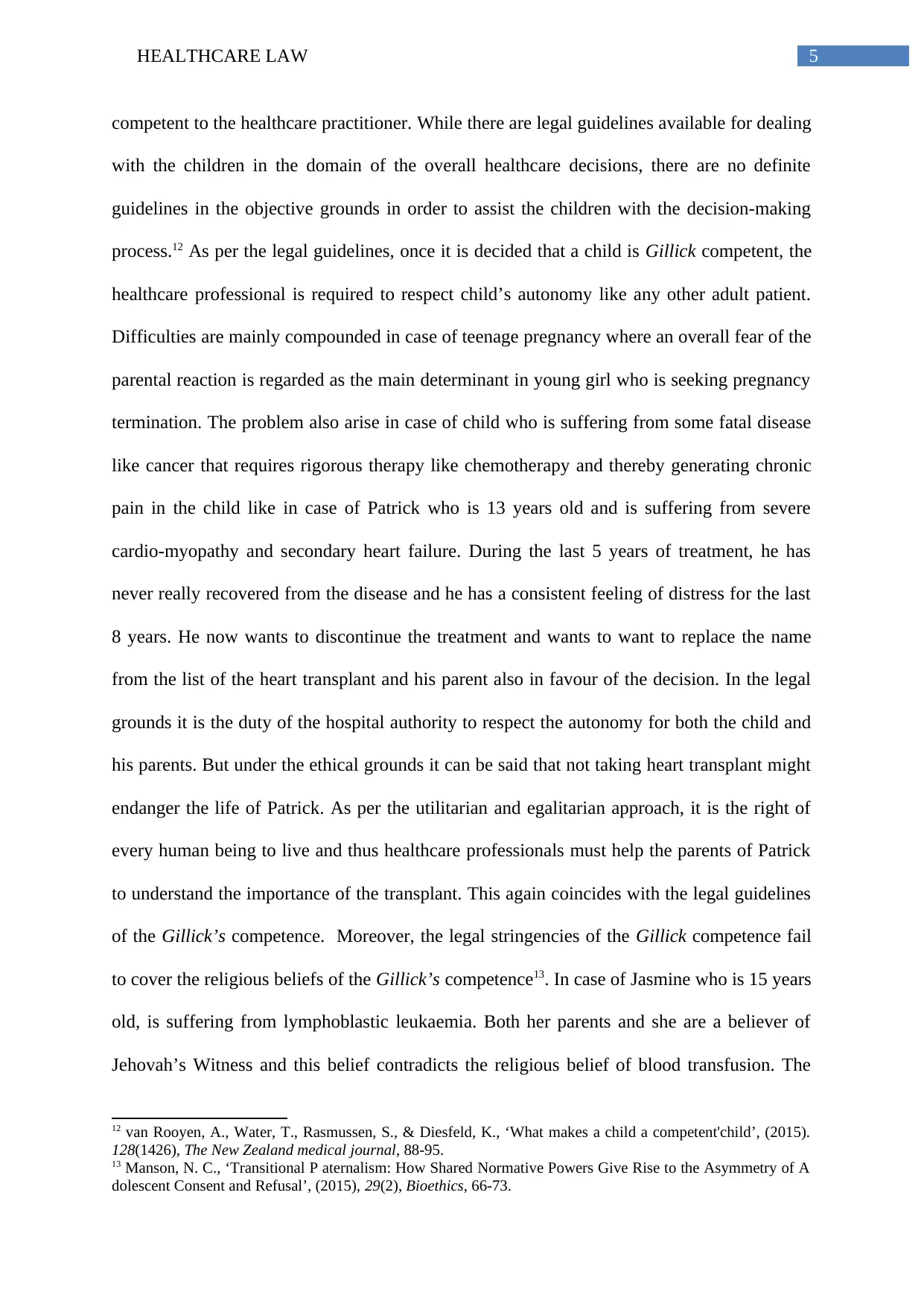
5HEALTHCARE LAW
competent to the healthcare practitioner. While there are legal guidelines available for dealing
with the children in the domain of the overall healthcare decisions, there are no definite
guidelines in the objective grounds in order to assist the children with the decision-making
process.12 As per the legal guidelines, once it is decided that a child is Gillick competent, the
healthcare professional is required to respect child’s autonomy like any other adult patient.
Difficulties are mainly compounded in case of teenage pregnancy where an overall fear of the
parental reaction is regarded as the main determinant in young girl who is seeking pregnancy
termination. The problem also arise in case of child who is suffering from some fatal disease
like cancer that requires rigorous therapy like chemotherapy and thereby generating chronic
pain in the child like in case of Patrick who is 13 years old and is suffering from severe
cardio-myopathy and secondary heart failure. During the last 5 years of treatment, he has
never really recovered from the disease and he has a consistent feeling of distress for the last
8 years. He now wants to discontinue the treatment and wants to want to replace the name
from the list of the heart transplant and his parent also in favour of the decision. In the legal
grounds it is the duty of the hospital authority to respect the autonomy for both the child and
his parents. But under the ethical grounds it can be said that not taking heart transplant might
endanger the life of Patrick. As per the utilitarian and egalitarian approach, it is the right of
every human being to live and thus healthcare professionals must help the parents of Patrick
to understand the importance of the transplant. This again coincides with the legal guidelines
of the Gillick’s competence. Moreover, the legal stringencies of the Gillick competence fail
to cover the religious beliefs of the Gillick’s competence13. In case of Jasmine who is 15 years
old, is suffering from lymphoblastic leukaemia. Both her parents and she are a believer of
Jehovah’s Witness and this belief contradicts the religious belief of blood transfusion. The
12 van Rooyen, A., Water, T., Rasmussen, S., & Diesfeld, K., ‘What makes a child a competent'child’, (2015).
128(1426), The New Zealand medical journal, 88-95.
13 Manson, N. C., ‘Transitional P aternalism: How Shared Normative Powers Give Rise to the Asymmetry of A
dolescent Consent and Refusal’, (2015), 29(2), Bioethics, 66-73.
competent to the healthcare practitioner. While there are legal guidelines available for dealing
with the children in the domain of the overall healthcare decisions, there are no definite
guidelines in the objective grounds in order to assist the children with the decision-making
process.12 As per the legal guidelines, once it is decided that a child is Gillick competent, the
healthcare professional is required to respect child’s autonomy like any other adult patient.
Difficulties are mainly compounded in case of teenage pregnancy where an overall fear of the
parental reaction is regarded as the main determinant in young girl who is seeking pregnancy
termination. The problem also arise in case of child who is suffering from some fatal disease
like cancer that requires rigorous therapy like chemotherapy and thereby generating chronic
pain in the child like in case of Patrick who is 13 years old and is suffering from severe
cardio-myopathy and secondary heart failure. During the last 5 years of treatment, he has
never really recovered from the disease and he has a consistent feeling of distress for the last
8 years. He now wants to discontinue the treatment and wants to want to replace the name
from the list of the heart transplant and his parent also in favour of the decision. In the legal
grounds it is the duty of the hospital authority to respect the autonomy for both the child and
his parents. But under the ethical grounds it can be said that not taking heart transplant might
endanger the life of Patrick. As per the utilitarian and egalitarian approach, it is the right of
every human being to live and thus healthcare professionals must help the parents of Patrick
to understand the importance of the transplant. This again coincides with the legal guidelines
of the Gillick’s competence. Moreover, the legal stringencies of the Gillick competence fail
to cover the religious beliefs of the Gillick’s competence13. In case of Jasmine who is 15 years
old, is suffering from lymphoblastic leukaemia. Both her parents and she are a believer of
Jehovah’s Witness and this belief contradicts the religious belief of blood transfusion. The
12 van Rooyen, A., Water, T., Rasmussen, S., & Diesfeld, K., ‘What makes a child a competent'child’, (2015).
128(1426), The New Zealand medical journal, 88-95.
13 Manson, N. C., ‘Transitional P aternalism: How Shared Normative Powers Give Rise to the Asymmetry of A
dolescent Consent and Refusal’, (2015), 29(2), Bioethics, 66-73.
⊘ This is a preview!⊘
Do you want full access?
Subscribe today to unlock all pages.

Trusted by 1+ million students worldwide
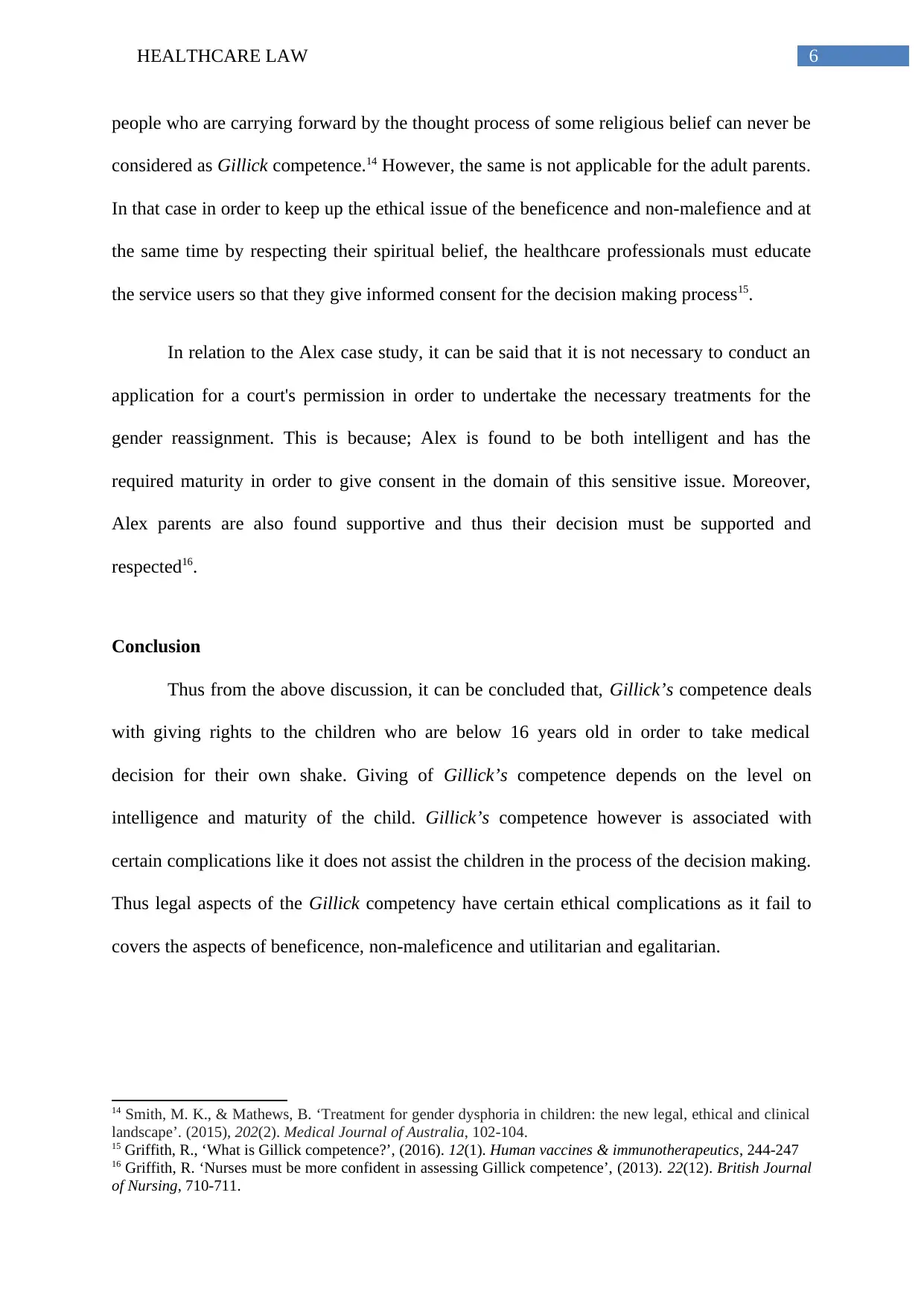
6HEALTHCARE LAW
people who are carrying forward by the thought process of some religious belief can never be
considered as Gillick competence.14 However, the same is not applicable for the adult parents.
In that case in order to keep up the ethical issue of the beneficence and non-malefience and at
the same time by respecting their spiritual belief, the healthcare professionals must educate
the service users so that they give informed consent for the decision making process15.
In relation to the Alex case study, it can be said that it is not necessary to conduct an
application for a court's permission in order to undertake the necessary treatments for the
gender reassignment. This is because; Alex is found to be both intelligent and has the
required maturity in order to give consent in the domain of this sensitive issue. Moreover,
Alex parents are also found supportive and thus their decision must be supported and
respected16.
Conclusion
Thus from the above discussion, it can be concluded that, Gillick’s competence deals
with giving rights to the children who are below 16 years old in order to take medical
decision for their own shake. Giving of Gillick’s competence depends on the level on
intelligence and maturity of the child. Gillick’s competence however is associated with
certain complications like it does not assist the children in the process of the decision making.
Thus legal aspects of the Gillick competency have certain ethical complications as it fail to
covers the aspects of beneficence, non-maleficence and utilitarian and egalitarian.
14 Smith, M. K., & Mathews, B. ‘Treatment for gender dysphoria in children: the new legal, ethical and clinical
landscape’. (2015), 202(2). Medical Journal of Australia, 102-104.
15 Griffith, R., ‘What is Gillick competence?’, (2016). 12(1). Human vaccines & immunotherapeutics, 244-247
16 Griffith, R. ‘Nurses must be more confident in assessing Gillick competence’, (2013). 22(12). British Journal
of Nursing, 710-711.
people who are carrying forward by the thought process of some religious belief can never be
considered as Gillick competence.14 However, the same is not applicable for the adult parents.
In that case in order to keep up the ethical issue of the beneficence and non-malefience and at
the same time by respecting their spiritual belief, the healthcare professionals must educate
the service users so that they give informed consent for the decision making process15.
In relation to the Alex case study, it can be said that it is not necessary to conduct an
application for a court's permission in order to undertake the necessary treatments for the
gender reassignment. This is because; Alex is found to be both intelligent and has the
required maturity in order to give consent in the domain of this sensitive issue. Moreover,
Alex parents are also found supportive and thus their decision must be supported and
respected16.
Conclusion
Thus from the above discussion, it can be concluded that, Gillick’s competence deals
with giving rights to the children who are below 16 years old in order to take medical
decision for their own shake. Giving of Gillick’s competence depends on the level on
intelligence and maturity of the child. Gillick’s competence however is associated with
certain complications like it does not assist the children in the process of the decision making.
Thus legal aspects of the Gillick competency have certain ethical complications as it fail to
covers the aspects of beneficence, non-maleficence and utilitarian and egalitarian.
14 Smith, M. K., & Mathews, B. ‘Treatment for gender dysphoria in children: the new legal, ethical and clinical
landscape’. (2015), 202(2). Medical Journal of Australia, 102-104.
15 Griffith, R., ‘What is Gillick competence?’, (2016). 12(1). Human vaccines & immunotherapeutics, 244-247
16 Griffith, R. ‘Nurses must be more confident in assessing Gillick competence’, (2013). 22(12). British Journal
of Nursing, 710-711.
Paraphrase This Document
Need a fresh take? Get an instant paraphrase of this document with our AI Paraphraser
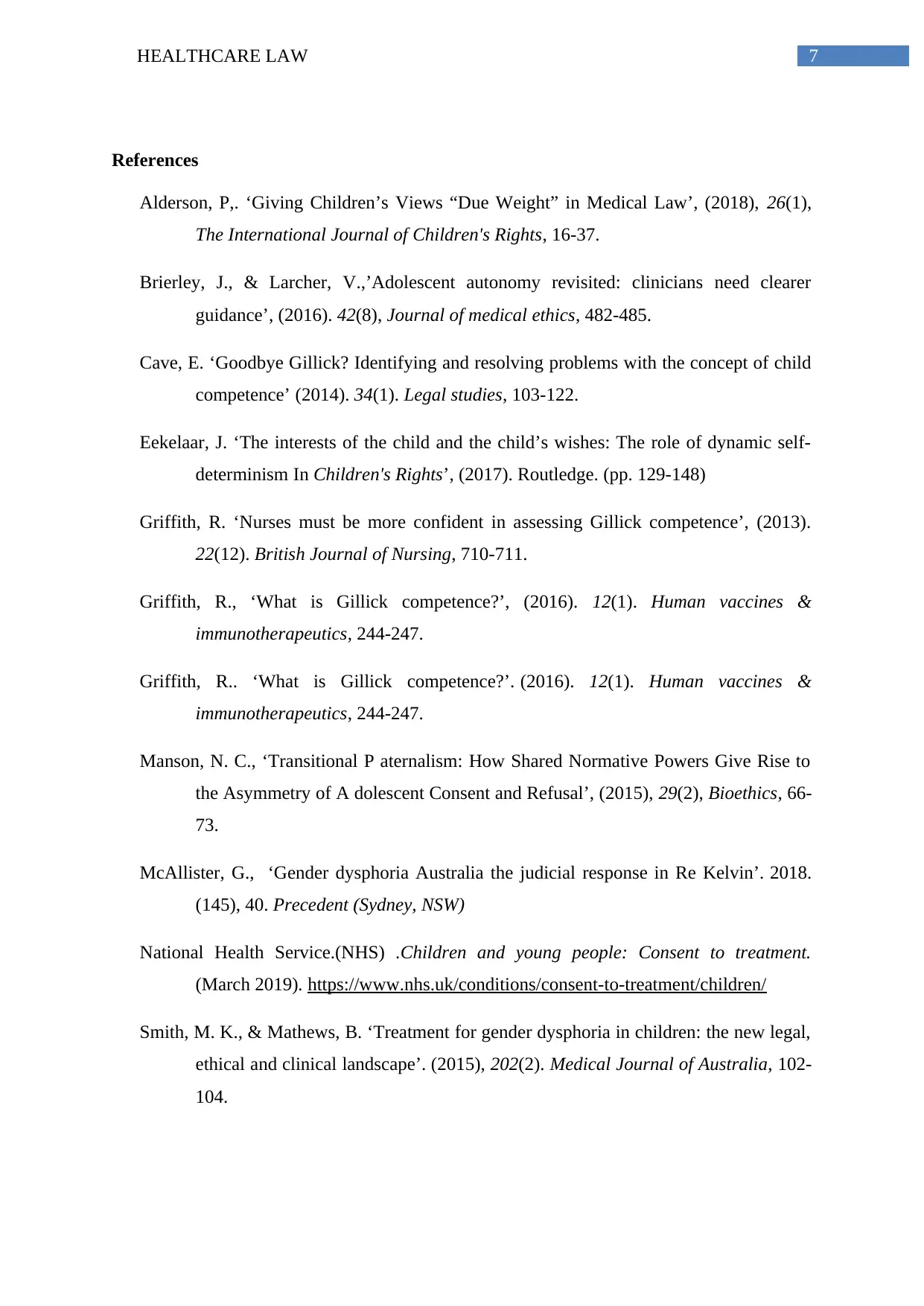
7HEALTHCARE LAW
References
Alderson, P,. ‘Giving Children’s Views “Due Weight” in Medical Law’, (2018), 26(1),
The International Journal of Children's Rights, 16-37.
Brierley, J., & Larcher, V.,’Adolescent autonomy revisited: clinicians need clearer
guidance’, (2016). 42(8), Journal of medical ethics, 482-485.
Cave, E. ‘Goodbye Gillick? Identifying and resolving problems with the concept of child
competence’ (2014). 34(1). Legal studies, 103-122.
Eekelaar, J. ‘The interests of the child and the child’s wishes: The role of dynamic self-
determinism In Children's Rights’, (2017). Routledge. (pp. 129-148)
Griffith, R. ‘Nurses must be more confident in assessing Gillick competence’, (2013).
22(12). British Journal of Nursing, 710-711.
Griffith, R., ‘What is Gillick competence?’, (2016). 12(1). Human vaccines &
immunotherapeutics, 244-247.
Griffith, R.. ‘What is Gillick competence?’. (2016). 12(1). Human vaccines &
immunotherapeutics, 244-247.
Manson, N. C., ‘Transitional P aternalism: How Shared Normative Powers Give Rise to
the Asymmetry of A dolescent Consent and Refusal’, (2015), 29(2), Bioethics, 66-
73.
McAllister, G., ‘Gender dysphoria Australia the judicial response in Re Kelvin’. 2018.
(145), 40. Precedent (Sydney, NSW)
National Health Service.(NHS) .Children and young people: Consent to treatment.
(March 2019). https://www.nhs.uk/conditions/consent-to-treatment/children/
Smith, M. K., & Mathews, B. ‘Treatment for gender dysphoria in children: the new legal,
ethical and clinical landscape’. (2015), 202(2). Medical Journal of Australia, 102-
104.
References
Alderson, P,. ‘Giving Children’s Views “Due Weight” in Medical Law’, (2018), 26(1),
The International Journal of Children's Rights, 16-37.
Brierley, J., & Larcher, V.,’Adolescent autonomy revisited: clinicians need clearer
guidance’, (2016). 42(8), Journal of medical ethics, 482-485.
Cave, E. ‘Goodbye Gillick? Identifying and resolving problems with the concept of child
competence’ (2014). 34(1). Legal studies, 103-122.
Eekelaar, J. ‘The interests of the child and the child’s wishes: The role of dynamic self-
determinism In Children's Rights’, (2017). Routledge. (pp. 129-148)
Griffith, R. ‘Nurses must be more confident in assessing Gillick competence’, (2013).
22(12). British Journal of Nursing, 710-711.
Griffith, R., ‘What is Gillick competence?’, (2016). 12(1). Human vaccines &
immunotherapeutics, 244-247.
Griffith, R.. ‘What is Gillick competence?’. (2016). 12(1). Human vaccines &
immunotherapeutics, 244-247.
Manson, N. C., ‘Transitional P aternalism: How Shared Normative Powers Give Rise to
the Asymmetry of A dolescent Consent and Refusal’, (2015), 29(2), Bioethics, 66-
73.
McAllister, G., ‘Gender dysphoria Australia the judicial response in Re Kelvin’. 2018.
(145), 40. Precedent (Sydney, NSW)
National Health Service.(NHS) .Children and young people: Consent to treatment.
(March 2019). https://www.nhs.uk/conditions/consent-to-treatment/children/
Smith, M. K., & Mathews, B. ‘Treatment for gender dysphoria in children: the new legal,
ethical and clinical landscape’. (2015), 202(2). Medical Journal of Australia, 102-
104.
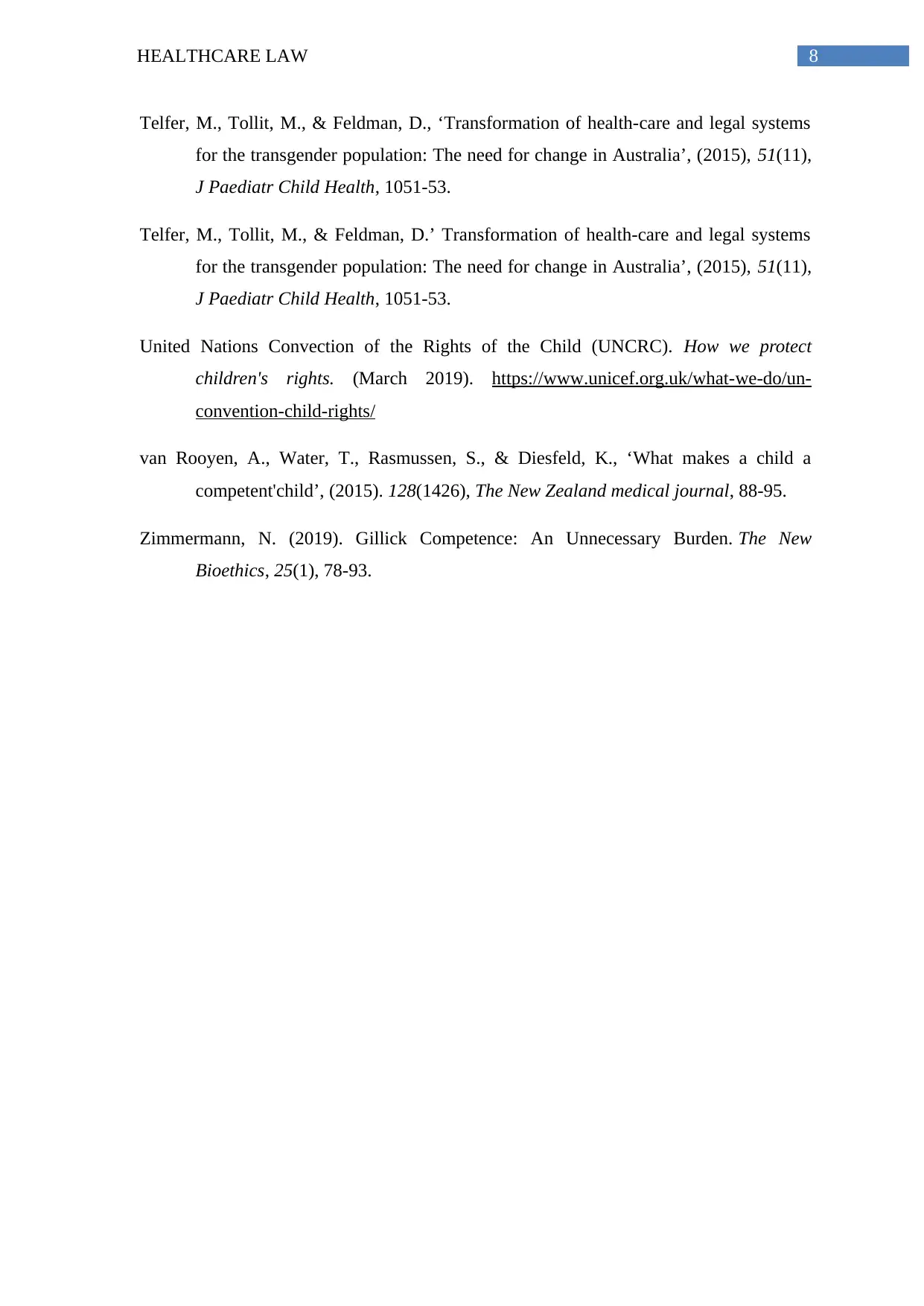
8HEALTHCARE LAW
Telfer, M., Tollit, M., & Feldman, D., ‘Transformation of health-care and legal systems
for the transgender population: The need for change in Australia’, (2015), 51(11),
J Paediatr Child Health, 1051-53.
Telfer, M., Tollit, M., & Feldman, D.’ Transformation of health-care and legal systems
for the transgender population: The need for change in Australia’, (2015), 51(11),
J Paediatr Child Health, 1051-53.
United Nations Convection of the Rights of the Child (UNCRC). How we protect
children's rights. (March 2019). https://www.unicef.org.uk/what-we-do/un-
convention-child-rights/
van Rooyen, A., Water, T., Rasmussen, S., & Diesfeld, K., ‘What makes a child a
competent'child’, (2015). 128(1426), The New Zealand medical journal, 88-95.
Zimmermann, N. (2019). Gillick Competence: An Unnecessary Burden. The New
Bioethics, 25(1), 78-93.
Telfer, M., Tollit, M., & Feldman, D., ‘Transformation of health-care and legal systems
for the transgender population: The need for change in Australia’, (2015), 51(11),
J Paediatr Child Health, 1051-53.
Telfer, M., Tollit, M., & Feldman, D.’ Transformation of health-care and legal systems
for the transgender population: The need for change in Australia’, (2015), 51(11),
J Paediatr Child Health, 1051-53.
United Nations Convection of the Rights of the Child (UNCRC). How we protect
children's rights. (March 2019). https://www.unicef.org.uk/what-we-do/un-
convention-child-rights/
van Rooyen, A., Water, T., Rasmussen, S., & Diesfeld, K., ‘What makes a child a
competent'child’, (2015). 128(1426), The New Zealand medical journal, 88-95.
Zimmermann, N. (2019). Gillick Competence: An Unnecessary Burden. The New
Bioethics, 25(1), 78-93.
⊘ This is a preview!⊘
Do you want full access?
Subscribe today to unlock all pages.

Trusted by 1+ million students worldwide
1 out of 9
Related Documents
Your All-in-One AI-Powered Toolkit for Academic Success.
+13062052269
info@desklib.com
Available 24*7 on WhatsApp / Email
![[object Object]](/_next/static/media/star-bottom.7253800d.svg)
Unlock your academic potential
Copyright © 2020–2025 A2Z Services. All Rights Reserved. Developed and managed by ZUCOL.





